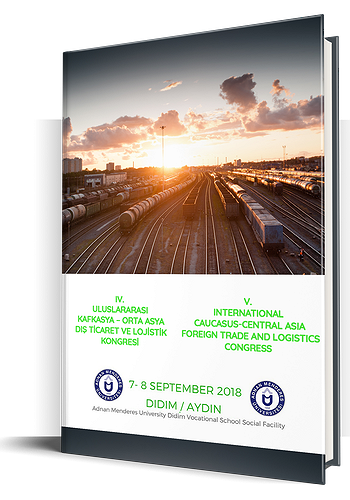
Ulaştırma ve Lojistik Kongreleri
- Türkçe
- Tam Metin
- 2018
Lojistikte İnovasyonun Önemi
Mert Aksungur
Mersin PTT Başmüdürlüğü, Mersin, Türkiye
Mustafa Bekmezci
Doç. Dr., Toros Üniversitesi, Mersin, Türkiye
Küreselleşme ve teknolojideki gelişmeler dünyada ticari faaliyetleri ve rekabeti, dolayısıyla lojistiğin önemini artırmıştır. Lojistik, malzemenin tedarikçiden işletmeye, işletmedeki faaliyetler nedeni ile işletme içinde ve işleminin bitmesini müteakip işletmeden müşteriye akışından sorumludur. Lojistiğin işletmenin performansı, varlıkların getirisi gibi konular üzerinde önemli bir etkisi vardır. Lojistik, teslim süresini, ürünün algılanan değerini, işletmenin güvenilirliğini ve müşteri hizmetlerini etkiler. Lojistiğin amacı; hızlı dağıtım yapmak, maliyeti düşürmek, verimi artırmak ve stokları azaltmak olmakla birlikte nihai amaç müşteri memnuniyetini sağlamaktır. Günümüzün yoğun rekabet ortamında işletmelerin hayatta kalması için müşteri beklentilerini fazlasıyla karşılaması, rakiplerine göre daha hızlı, ürününün de daha ucuz ve daha kaliteli olması gerekmektedir. Ürün maliyetinin %21’i lojistik faaliyetlerden kaynaklanmaktadır. Bu oranı düşürmek üründen ziyade ilk tedarikçiden müşteriye kadar olan malzemenin akış sürecine odaklanmayı gerektirir. Maliyeti düşürmek için bu süreçte yapılan her değişiklik, her yenilik ticari bir anlam ifade ettiğinden inovasyon olarak değerlendirilebilir. Çünkü inovasyon, yeni veya ciddi ölçüde geliştirilmiş ürünün (mal veya hizmet) veya sürecin, yeni pazarlama yönteminin veya yeni örgütsel yöntemin işletme içi uygulamalarında, işyeri organizasyonunda veya dış ilişkilerde uygulanmasıdır. Ürün/hizmet, süreç, örgütsel ve pazarlama olmak üzere dört inovasyon türü bulunmaktadır. Depolama, envanter yönetimi, elleçleme, paketleme, sipariş işleme, talep tahmini ve müşteri hizmetlerinden oluşan lojistik faaliyetlerinin her biri için inovasyonun bu dört türü de uygulanabilir. Nitekim ABD’de yapılan bir araştırmada, lojistik sektörü, 21. yüzyılda gelişme göstermesi beklenen ilk üç sektör arasında yer almıştır. Bu çalışmada lojistikte inovasyon ve inovasyonun öneminden bahsedilmiş, Türkiye’de ve dünyada lojistik şirketlerinin inovasyon uygulamalarından örneklere yer verilmiş ve lojistik sektöründeki işletmelere önerilerde bulunulmuştur.
Anahtar Kelimeler: İnovasyon ve Lojistik, İnovasyon, Lojistik
Importance of Inovations In Logistics
Globalisation and the progresses in technology have increased the importance of logistics due to the amount of commercial activities. Logistics is responsible for the material flow from the supplier to the businesses, within the business for operational activities, and from the businesses to the customers. Logistics has an essential effect on the matters such as performance of the business, proceeds of the material. Logistics affects the time of delivery, perceived value of the material, the credibility of the business and customer services. Although the purposes of logistics are fast delivery, reducing the costs, increasing the efficiency and destocking; final purpose is customer satisfaction. Businesses need to satisfy the expectations of the customers, faster than the rival companies and have cheaper but higher quality products to be able to survive in the intense competitive environment. 21% of the product costs belong to logistic activities. Reducing this rate requires focusing on the flow of the material from the initial supplier to the customer rather than the product itself. As every improvement which is made in order to reduce the cost is commercially important, they can be taken as an innovation. Innovation is the implementation of a new or highly improved product (good or service) or a process, a new marketing process or operational method in workplace practices, organizations of the business or external relations. Four types of innovation are goods/services, process, organizational and marketing. These four types of innovation can be applied for each of the logistics activities consisting of storage, inventory management, handling, packing, order fulfillment, demand forecasting and customer services. Hence in a research made in United States of America, logistics is among the first three sectors expected to improve in 21st century. In this study, innovation and importance of innovation in logistics are mentioned, samples of innovation practices in Turkey and around the world are shown and suggestions are made for the businesses in logistics sector.
Keywords: Logistics, Inovation, Inovation and Logistics

IV. International Caucasus-Central Asia Foreign Trade and Logistics Congress Proceeding Book
E-ISBN: 978-605-68889-0-8
Sayfa: 69-77

Bu çalışma, kullanan kişilere orjinal çalışmadan alıntı yaptıkları sürece, çalışmayı dağıtma, değiştirme ve üzerine çalışma hakkı tanıyan Attribution 4.0 International (CC BY 4.0) lisansı ile lisanslanmıştır.
İletişim
İstanbul Üniversitesi Ulaştırma ve Lojistik Fakültesi
İ.Ü. Avcılar Kampüsü 34320 Avcılar/İstanbul
ulk@istanbul.edu.tr
+ 90 (212) 440 00 00 - 19200


